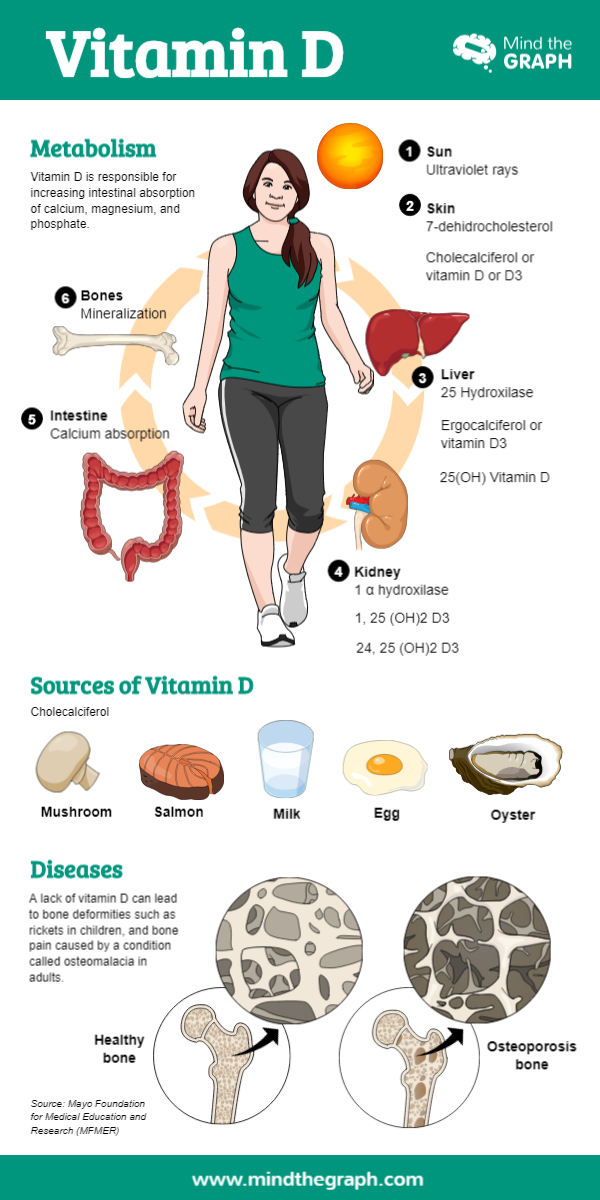Are you continuing to supplement Vitamin D after the pandemic? // Você segue suplementando Vitamina D após a pandemia?

Vitamin D is an essential nutrient for human health and plays an important role in regulating bone metabolism and immune function. During the Covid-19 pandemic, there was growing interest in vitamin D supplementation as a way to strengthen the immune system and reduce the risk of infection. However, as society has normalized and vaccination has advanced, many people may have stopped using vitamin D as a supplement. In this article, we will discuss the current scientific evidence on vitamin D supplementation during Covid-19 and whether people should still continue using this supplement.
Vitamin D and Covid-19: scientific evidence
Vitamin D plays an important role in regulating immune function, including the production of antimicrobial peptides and cytokines. Several observational studies have suggested that vitamin D deficiency may be associated with an increased risk of respiratory infections, including Covid-19. However, the results of these studies were inconsistent and did not allow a causal relationship between vitamin D deficiency and susceptibility to Covid-19 to be established. A retrospective study in patients hospitalized with Covid-19 in Spain reported that most patients had inadequate vitamin D levels in their blood. However, this study was not designed to evaluate the effect of vitamin D supplementation on Covid-19 and cannot establish a causal relationship between vitamin D deficiency and the severity of Covid-19. Another retrospective study in patients with Covid-19 in Italy reported that daily vitamin D supplementation reduced the risk of ICU (Intensive Care Unit) admission and mortality in patients with vitamin D deficiency. However, this study was limited by small sample size and lack of randomization.
A randomized controlled trial in hospitalized patients with Covid-19 in India reported that vitamin D supplementation reduced mortality in patients with vitamin D deficiency, but had no effect in patients with adequate vitamin D levels. However, this study was limited by small sample size and lack of double-blind. The World Health Organization (WHO) and other health organizations recommend vitamin D supplementation for people with vitamin D deficiency, especially those at higher risk of deficiency, such as the elderly and people with chronic diseases. However, the WHO does not recommend routine vitamin D supplementation to prevent Covid-19, due to a lack of sufficient scientific evidence.

Source
Vitamin D supplementation after the normalization of society
With the normalization of society and the advance of vaccination, many people may have stopped using vitamin D as a supplement. However, vitamin D deficiency is still common in many parts of the world, especially in the elderly, people with dark skin, and those with less sun exposure. In addition, vitamin D has several other health benefits, including regulating bone metabolism and reducing the risk of chronic diseases such as diabetes, cardiovascular disease, and cancer. A recent study in adults in the United States reported that the prevalence of vitamin D deficiency decreased from 35% to 18% between 2001 and 2016 due to vitamin D supplementation and food fortification. However, there are still many people with vitamin D deficiency, especially those at higher risk of deficiency. Vitamin D supplementation is generally considered safe, as long as it is taken within the recommended dose. However, excess vitamin D can lead to side effects, such as hypercalcemia and hypercalciuria, which can damage the kidneys and other organs. Therefore, it is important to consult a healthcare professional before you start taking vitamin D supplements.
Conclusion
Vitamin D is an essential nutrient for human health and plays an important role in regulating bone metabolism and immune function. During the Covid-19 pandemic, there was growing interest in vitamin D supplementation as a way to strengthen the immune system and reduce the risk of infection. However, the scientific evidence on the effect of vitamin D supplementation on Covid-19 is limited and does not allow a causal relationship to be established. With the normalization of society and the advance of vaccination, many people may have stopped using vitamin D as a supplement. However, vitamin D deficiency is still common in many parts of the world, especially in the elderly, people with dark skin, and those with less sun exposure. In addition, vitamin D has several other health benefits, including regulating bone metabolism and reducing the risk of chronic diseases.


A vitamina D é um nutriente essencial para a saúde humana e tem um papel importante na regulação do metabolismo ósseo e na função imunológica. Durante a pandemia de Covid-19, houve um interesse crescente na suplementação da vitamina D como uma forma de fortalecer o sistema imunológico e reduzir o risco de infecção. No entanto, com a normalização da sociedade e o avanço da vacinação, muitas pessoas podem ter parado de usar a vitamina D como suplemento. Neste artigo, vamos discutir a evidência científica atual sobre a suplementação da vitamina D durante o Covid-19 e se as pessoas ainda devem continuar usando esse suplemento.
Vitamina D e Covid-19: evidência científica
A vitamina D tem um papel importante na regulação da função imunológica, incluindo a produção de peptídeos antimicrobianos e citocinas. Vários estudos observacionais sugeriram que a deficiência de vitamina D pode estar associada a um maior risco de infecções respiratórias, incluindo a Covid-19. No entanto, os resultados desses estudos foram inconsistentes e não permitiram estabelecer uma relação causal entre a deficiência de vitamina D e a suscetibilidade à Covid-19. Um estudo retrospectivo em pacientes hospitalizados com Covid-19 na Espanha relatou que a maioria dos pacientes tinha níveis inadequados de vitamina D no sangue. No entanto, este estudo não foi projetado para avaliar o efeito da suplementação de vitamina D na Covid-19 e não pode estabelecer uma relação causal entre a deficiência de vitamina D e a gravidade da Covid-19. Outro estudo retrospectivo em pacientes com Covid-19 na Itália relatou que a suplementação diária de vitamina D reduziu o risco de internação na UTI (Unidade de Terapia Intensiva) e a mortalidade em pacientes com deficiência de vitamina D. No entanto, este estudo foi limitado pelo pequeno tamanho da amostra e pela falta de randomização.
Um estudo randomizado controlado em pacientes hospitalizados com Covid-19 na Índia relatou que a suplementação de vitamina D reduziu a mortalidade em pacientes com deficiência de vitamina D, mas não teve efeito em pacientes com níveis adequados de vitamina D. No entanto, este estudo foi limitado pelo pequeno tamanho da amostra e pela falta de duplo-cego. A Organização Mundial da Saúde (OMS) e outras organizações de saúde recomendam a suplementação de vitamina D para pessoas com deficiência de vitamina D, especialmente aquelas com maior risco de deficiência, como idosos e pessoas com doenças crônicas. No entanto, a OMS não recomenda a suplementação de rotina de vitamina D para prevenir a Covid-19, devido à falta de evidência científica suficiente.

Source
Suplementação de vitamina D após a normalização da sociedade
Com a normalização da sociedade e o avanço da vacinação, muitas pessoas podem ter parado de usar a vitamina D como suplemento. No entanto, a deficiência de vitamina D ainda é comum em muitas partes do mundo, especialmente em idosos, pessoas com pele escura e aquelas com menor exposição solar. Além disso, a vitamina D tem vários outros benefícios para a saúde, incluindo a regulação do metabolismo ósseo e a redução do risco de doenças crônicas, como diabetes, doenças cardiovasculares e câncer. Um estudo recente em adultos nos Estados Unidos relatou que a prevalência de deficiência de vitamina D diminuiu de 35% para 18% entre 2001 e 2016, devido à suplementação e à fortificação de alimentos com vitamina D. No entanto, ainda há muitas pessoas com deficiência de vitamina D, especialmente aquelas com maior risco de deficiência. A suplementação de vitamina D é geralmente considerada segura, desde que seja tomada dentro da dose recomendada. No entanto, o excesso de vitamina D pode levar a efeitos colaterais, como hipercalcemia e hipercalciúria, que podem danificar os rins e outros órgãos. Por isso, é importante consultar um profissional de saúde antes de começar a tomar suplementos de vitamina D.
Conclusão
A vitamina D é um nutriente essencial para a saúde humana e tem um papel importante na regulação do metabolismo ósseo e na função imunológica. Durante a pandemia de Covid-19, houve um interesse crescente na suplementação da vitamina D como uma forma de fortalecer o sistema imunológico e reduzir o risco de infecção. No entanto, a evidência científica sobre o efeito da suplementação de vitamina D na Covid-19 é limitada e não permite estabelecer uma relação causal. Com a normalização da sociedade e o avanço da vacinação, muitas pessoas podem ter parado de usar a vitamina D como suplemento. No entanto, a deficiência de vitamina D ainda é comum em muitas partes do mundo, especialmente em idosos, pessoas com pele escura e aquelas com menor exposição solar. Além disso, a vitamina D tem vários outros benefícios para a saúde, incluindo a regulação do metabolismo ósseo e a redução do risco de doenças crônicas.
Obrigado por promover a comunidade Hive-BR em suas postagens.
Vamos seguir fortalecendo a Hive
Rapaz, eu comecei minha suplementacao de vitamina D desde que mudei pro Canada, e apesar da ligação direta entre COVID e vitamina D ainda nao tenha nada concreto, 'e sabido que essa vitamina tem uma ligaçao bem forte com o sitema imunologico, até maior do que a vitamina C que no brasil é o primeiro a ser tomado no caso duma gripe!
Exato! Ajuda muito na imunidade e também na construção do cálcio no corpo, por garantia é melhor do que não tomar, e dependendo do país e até mesmo da sua rotina e função de trabalho (como pessoas que nunca saem pro sol puro) tomar ela é imprescindível.
Thanks for your contribution to the STEMsocial community. Feel free to join us on discord to get to know the rest of us!
Please consider delegating to the @stemsocial account (85% of the curation rewards are returned).
You may also include @stemsocial as a beneficiary of the rewards of this post to get a stronger support.
Doctors now are recommending taking vitamin D anyhow, and this was true before the pandemic. I live in Cyprus, where it's very sunny most of the year, and my chemist tells me that half the people who test for vitamin D have a deficiency, which is kinda extraordinary. So, as you perhaps imply in your conclusion, perhaps we should all be taking vitamin D anyway.
Yes, even sun exposure is sometimes less than the minimum necessary. Much of this is also because people tend to protect themselves from the sun for fear of skin diseases, but there is a healthy threshold.
Supplementing is key! Thanks for responding!
I always said that natural vitamin D from the sun was a good strategy to fight Covid, but I didn't know the implications about having good levels of vitamin D on a daily basis, thanks for sharing!
By the way, I noticed you used Threads back in August '22 when it was still a rudimentary interface with many bugs, perhaps you want to give it another try now that there's a new interface now and Threads have improved a lot
Thanks for the suggestion about Threads! I will test it!
And about the sun and vitamin D, yeah, some countries have very low sun exposure, and in other countries people overprotect themselves all the time, almost always supplemental is ideal!
There is reasonable evidence that this article is machine-generated. Posting such content is considered fraud.
Fraud is discouraged by the community and may result in the account being Blacklisted.
Guide: Why and How People Abuse and Defraud
If you believe this comment is in error, please contact us in #appeals in Discord.